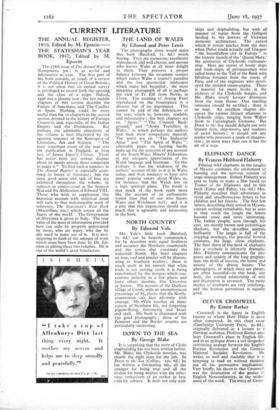It is surprising that the story of Clyde shipbuilding has
not been written before. Mr. Blake, the Clydeside novelist, was dearly the right man for the job. :In Down to the Sea (Collins, 22s. 6d.) he has written a fascinating tale, all the stranger for being true and all the livelier for being written with the infec- tious enthusiasm of an author in love with his subject. It deals not only with
ships and shipbuilding, but with all manner of topics from the Gallipoli landing to the horrors of Victorian domestic architecture. The period which it covers reaches from the days when Defoe could actually call Glasgow " the beautifullest city in Europe " to the historic launch of the ' Queen Mary,' the apotheosis of Clydeside craftsman- ship. Here are stories of lovely ships and freak-ships, of privateersmen who sailed home to the Tail of the Bank with fabulous fortunes from the coasts of Peru, and of the engineers who devel- oped the derided steam-engine. There is material for many books in, the archives of the Clydeside burghs, and Mr. Blake wisely favours diversions from the main theme. One, 'startling omission should be rectified ; there is no map. An excellent chapter dis- cusses the various literary allusions to Clydeside ships, ranging from Walter
Scott to Cunningham Grahame. But Down to the Sea should delight not only
literary men, ship-lovers, and students of social history ; it should stir any reader who possesses a spark of imagina- tion ; in more ways than one it has the air of a saga.














































 Previous page
Previous page